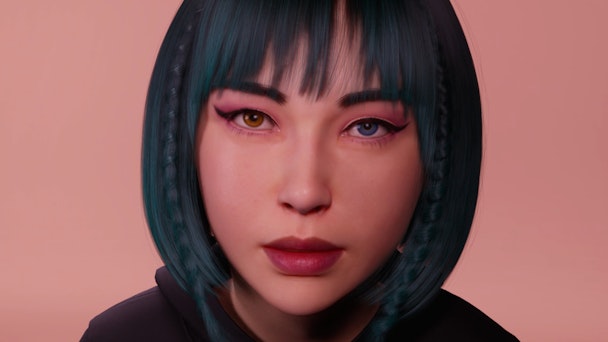Dentsu joins virtual influencer game with dedicated Virtual Identity service
Dentsu Creative Singapore has unveiled a new service for brands that promises to wring organic marketing results from entirely artificial creative assets.

Dentsu Creative’s Virtual Identity team have created a demo character named Rumi, after the medieval Persian poet / Dentsu Creative Singapore
The agency is touting a ‘Virtual Identity’ service that combines gaming and cinema-grade motion capture, streaming and CGI tech to create virtual avatars or characters that become brand assets or mascots. The team working on the service will be led from Singapore by chief creative officer Stan Lim.
Agencies and startups such as Live and Breathe and Brud have created virtual characters previously, primarily for use as ‘influencers.’ Dentsu’s foray into the sector marks the first time a network or holding company agency has engaged in the practice. The agency claims the service is the ‘first of its kind’ and has been in development since the beginning of 2021.
Fred Levron, global chief creative officer, Dentsu International, said growing interest and investment in the metaverse meant there was an opportunity for the agency. “The lines between the online and offline world are increasingly blurred, and we’re at the tipping point to see the potential of the metaverse fully realized,” he said.
“Brands need to show up where their customers are, and we are ready to help our clients invent a future where they can interact with their consumers online as emotively as they could in a bricks and mortar store, at a concert or event.”
In plain English, the agency is offering clients the chance to create bespoke characters tailored to their audience and brand profile, or employ a range of ‘off-the-peg’ virtual identities. Dentsu Creative Singapore is offering support for long-term projects, as well as short- and mid-term activations. A spokesperson for Dentsu Creative Singapore declined to name any of the clients currently using the service.
The team has created a demo character for the agency named Rumi – a given name in Japanese, and also the namesake of a 13th-century Persian poet whose verse ”live life as if everything is rigged in your favor. I am not this hair, I am not this skin, I am the soul that lives within” formed the inspiration for the character.
It comes as the popularity of these influencers rises. One example is Rae, a virtual influencer that collaborated with real brands and released NFTs (and garnered real interviews in Vogue) last year.
Prema Techinamurthi, managing director of Dentsu Creative Singapore, told The Drum that virtual influencers need not be the only use case for the technology, noting that it could be of use to an advertiser “already investing heavily in human influencers, a brand that wants a foray into the virtual influencers, or simply one that is looking to improve customer experiences.”
Earlier creations have largely been limited to proof-of-concept characters, such as Brud’s Lil Miquela or Shudu Gram, created by photographer Cameron-James Wilson and agency The Diigitals.
Auckland startup Soul Machines, however, offers clients the chance to create similar virtual characters for employment in customer-service roles. The Drum explored the company’s pitch to consumer brands, and went behind the scenes of a demo character’s creation in 2019.
According to its press release, the agency suggests the service could be applied to create not just virtual influencers, but “NPCs in metaverse and game worlds ... AI-driven product experts, CX reps in physical stores, e-commerce platforms, live selling and mobile apps.”
Dentsu’s product would rely primarily on actors working with motion capture suits to “control” a virtual character “in real-time.” Wardrobe, props, lighting, background and setting would be produced within a game engine, while the ‘virtual identities’ would primarily exist on social and streaming platforms such as Discord, Twitch and TikTok.
The agency is also offering brands the chance to stage indoor and outdoor real-world appearances from their characters with the use of holograms, or in remote working platforms such as Zoom.
“Dentsu VI is a game changer for brands wanting to innovate how they show up in the digital world,” said Techinamurthi.
